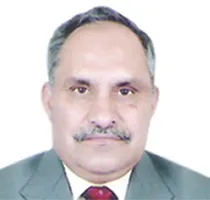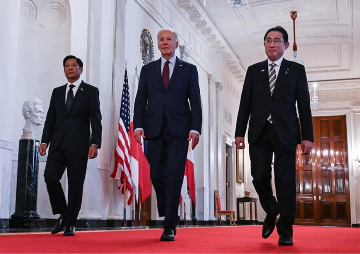Nations are neither born great nor do they have greatness thrust on them. Great powers are born of the steely resolve, clarity of vision, unswerving dedication, hard work and unselfish sacrifice of the people and of those they select to lead them. There can be no better example of this than that of Zulfikar Ali Bhutto’s interview to a British newspaper in 1965. When asked what Pakistan would do if India made the (Atom) bomb, he famously replied that “we will eat grass, even go hungry but we will get one of our own.” Though by no means is Pakistan a great power today, yet the fact that we are now confronted by a nuclear-capable neighbour is surely a testament to their vision, resolve, focus and strength of character.
In startling contrast, it has been reported by our media that the Mountain Strike Corps (MSC) that has been under raising, in dribs and drabs, over the past five years is now being put into cold storage. Ostensibly this is being done due to a serious funds crunch that has impacted the military, but snide allegations are also being bandied about that this whole enterprise was motivated not so much by national security considerations, but by an Army hierarchy keen on increasing the number of senior posts that such a raising would have resulted in. Even if there was a grain of truth in the latter allegation, which is unlikely, it is dissimulation and sheer poppycock to suggest that offensive strike formations for the mountains are not required. That is unless of course one lives in denial as to the threat we face from China, or what is more likely, suffer from a defeatist mentality.
There are those, and this includes many in our political and foreign policy establishments, who firmly believe that given the vastly asymmetric nature of our economic power and defence capabilities vis-a-vis China, it is in our interest to avoid all confrontation regardless of however grave the provocation may be. They appear to be unaware or unwilling to comprehend that a defensive strategic posture can only succeed if it is complemented by the requisite capability to strike at the enemy. It is not without reason that Sun Tzu in his classic treatise, the “Art of War”, suggests that “Attack is the secret of defence; defence is the planning of an attack”. Such advice can only be ignored at grave peril to national integrity and honour. While there may be reservations or disagreements as to the manner in which the MSC should be organized, its necessity was never in doubt and it was viewed as an extremely critical step in enhancing our deterrent capabilities against China, especially by the PLA, given their rabid objections at the time.
There remain a substantial number of analysts and experts who, while agreeing with the proposition that China does pose a serious challenge, tend to believe that while continuing to contain them along our land borders, our focus should be on enhancing our maritime capabilities. Given that over 75% of China’s trade and energy requirements pass through the Indian Ocean, a potent naval capability would act as a serious deterrent to any future confrontation that they may contemplate. This would be more so given the geo-strategic advantages that our location in the Indian Ocean provides us, especially the Andaman and Nicobar Islands, which allow us a stranglehold on movement through the Malacca Straits. While such an approach seems logical given our financial constraints and the fact that our Navy is presently superior to the PLAN, especially in the long run, the truth is it cannot be done without serious effort being made to address our vulnerabilities along our land borders on priority. We cannot afford to ignore the reality that if such steps are not initiated we may well lose the entire North East, not just Arunachal Pradesh. That would be a catastrophe and lead to our destruction as a Nation.
Unfortunately, placing of the MSC into a deep freeze is just another action, in a series of steps, taken by this government to ingratiate itself with the Chinese President after Mr Modi’s capitulation at Wuhan. It only adds to this Government’s silence on the PLA’s occupation of Doklam and the Jhamperi Ridge, gold mining in Arunachal Pradesh, downgrading of relations with the Dalai Lama and his Tibetan Government in Exile and the outrage by Air India of renaming Taiwan as Chinese Taipei. There is little doubt that despite its ultra-nationalistic rhetoric this government will do anything, even grovel, to avoid China creating any disturbances on the border that may impact Mr Modi’s larger than life image in the forthcoming General Elections due next year.
Another clear indicator of our lack of resolve, unwillingness to make the necessary sacrifices and flawed thinking is our assumption that in the event of a conflict with either or both of our hostile neighbours we will be faced with a short sharp intense war that will be terminated at the behest of the international community within a fortnight or so, given the nuclear backdrop. Indeed all our planning and preparations rest on this misplaced assumption. War is serious business, unlike a game of limited overs cricket, and if we are to retain our credibility as a serious player on the international stage, we must clearly let the world know that we cannot be pushed around and would willingly the sacrifices required to protect our honour and achieve our strategic goals, however long or arduous the campaign.
Timidity and a clear lack of professionalism have also exposed one of the biggest flaws in our strategic thought. It is the inability of our top leadership to appreciate the implications of what prolonged operations in high altitude terrain entails. While the PLA may have the administrative and logistic capability to induct 28-30 Divisions into Tibet, maintaining their combat effectiveness over a prolonged duration is another matter. Apart from the difficulties psychological and medical issues faced by soldiers operating for prolonged periods in high altitudes, they also have to deal with a restive population and long and vulnerable lines of communications. The abject fear and paralysis we continue to display at the very thought of escalation, therefore, makes little sense.
There is little doubt that restrictions on our defence expenditure, presently at a minuscule 1.56% of GDP, are self- imposed. This and earlier governments have had little hesitation in more than double the strength of our Para Military and Central Armed Police Forces over just this past decade. There also seems to be no shortage of funds for bailing out Public Sector Banks and Companies, writing off farmer debts and subsidizing myriad other requirements. The reasons for this are not difficult to guess. Clearly, political parties across the spectrum are only interested in protecting and increasing their vote banks and expenditure on the military are seen as a waste of money as their votes, at least those who actually get to, are minuscule in numbers and of little value.
The sad fact is that they would gladly sacrifice our ability to defend our territorial integrity if they can get away with it. Mr Modi found himself in an unenviable position of having to take responsibility for years of neglect once the initial impact of the Doklam confrontation had worn off. He has clearly realized that the military is in no position to take on the PLA in the dismal state that it is in. Also, any attempt to improve the military’s capabilities along the LAC at the present time would only lead to escalation, and given the existing military balance of power result in grave embarrassment for him and his government. The only logical option available to him is to swallow his pride and buy time in the vague hope that he would be able to take remedial measures after winning the forthcoming elections.
Finally, his invitation to President Trump as the Chief Guest for the Republic Day Parade in 2019 should be seen in this context. An acceptance would signify that we continue to be seen as an important strategic partner of the United States, which while enhancing Mr Modi’s reputation domestically, may just act as a deterrent on Chinese ambitions, though it is more than likely that nothing of import will transpire apart from some mindless semantics and hyperbole. There is, of course, the very real possibility, given President Trump’s antics at the recently concluded NATO Summit and during his visit to the United Kingdom that Mr Modi might find that he has bitten off more than he can chew.
This commentary originally appeared in The Times of India.
The views expressed above belong to the author(s). ORF research and analyses now available on Telegram! Click here to access our curated content — blogs, longforms and interviews.




 PREV
PREV


